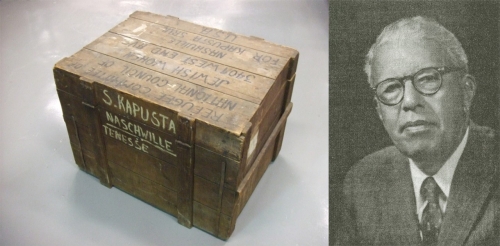Tennessee State Museum Offers Collection Highlight and Lunch & Learn in Partnership with Violins of Hope Nashville
Display of Holocaust Survivors’ Crate and Lunch and Learn about Mortimer May Part of Museum’s March Programming
NASHVILLE, Tenn. — March 6, 2018 — Tennessee State Museum will present two free events in March in partnership with the arrival the Violins of Hope in Nashville, a display of a Holocaust Survivor’s Crate from the Museum’s collection, and a Lunch and Learn Lecture with Jack May about his uncle, Mortimer May, a Tennessee Holocaust Hero. Information about both events is below.
COLLECTIONS HIGHLIGHT – A HOLOCAUST SURVIVORS’ CRATE
March 9-18, 2018 (Closed Monday) at Tennessee State Museum (505 Deaderick St., Nashville. 615-741-2692)
As part of its special programming coinciding with Violins of Hope Nashville, the Tennessee State Museum will display a rare artifact connected with Jewish survivors’ immigration to Nashville. The crate belonged to the Srul Kapusta family and was shipped from Czechoslovakia to the National Council of Jewish Women in Nashville after World War II. The Council’s Nashville chapter was one of many organizations across the country charged with resettling Holocaust refugees. Each refugee family received only one crate this standard size for shipping belongings to their new home. Few such crates have survived. An interesting detail is the way “Naschwille/Tenesse” is spelled on one side of the crate, according to the phonetics of the language spoken where the crate was packed and shipped.
At the Museum’s Lunch & Learn event featuring Jack May on March 15 at 12:15 p.m., Tennessee State Museum curator Candace J. Adelson, Ph.D., will be on hand to discuss the crate.
LUNCH & LEARN – MORTIMER MAY, A TENNESSEE HOLOCAUST HERO
Thursday, March 15, 2018, 12:15 pm, Tennessee State Museum (505 Deaderick St., Nashville. 615.741.2692)
Nashville native Jack May speaks about the heroism and legacy of his uncle Mortimer May, a prominent business owner in Nashville who traveled to Europe in the 1930s to help Jews escape rising Nazi tyranny and anti-Semitism. This Lunch & Learn will also provide a special opportunity to view a Tennessee State Museum artifact connected with Jewish survivors’ immigration to Nashville: a crate belonging to the Srul Kapusta family, shipped from Czechoslovakia to the National Council of Jewish Women in Nashville after World War II. The Nashville chapter of the Council was one of many organizations across the country charged with resettling Holocaust refugees. Museum curator Candace J. Adelson, Ph.D., will be on hand to discuss the crate, which will be on display at the Museum from March 9 to 18.
The State Museum’s Lunch & Learn series is a chance for participants to eat lunch while learning about Tennessee history. Presentations begin at 12:15 p.m. and last about 30 minutes. All programs are FREE to the public and take place on Level B of the State Museum in front of the stage. For those unable to attend the Lunch and Learn, the event will be Livestreamed on the Tennessee State Museum’s Facebook Page.
The Violins of Hope are a collection of restored instruments played by Jewish musicians during The Holocaust. These instruments have survived concentration camps, pogroms and many long journeys to tell remarkable stories of injustice, suffering, resilience and survival. The Nashville Symphony is bringing the Violins of Hope to Nashville to facilitate a citywide dialogue about music, art, social justice and free expression.
The Nashville Symphony has partnered with more than two dozen local groups and organizations on a community-wide series of events around these instruments, highlighted by an exhibition at the Nashville Public Library. The sound, presence and stories of these instruments will drive the creation of music, visual art, theater, public conversation, interfaith dialogue, readings and educational activities throughout Middle Tennessee. Learn more at http://www.violinsofhopensh.com/.
About the Tennessee State Museum:
The Tennessee State Museum was established by law in 1937 “to bring together the various collections of articles, specimens, and relics now owned by the State under one divisional head,” and “to provide for a transfer of exhibits wherever they may be.”
Today, the Tennessee State Museum is housed in the James K. Polk building in downtown Nashville, where it has been for nearly 35 years. Gov. Bill Haslam proposed and the Tennessee General Assembly approved $120 million in the FY-2015-16 budget to build a new home for the Tennessee State Museum on the Bicentennial Mall to maximize the state’s rich history by creating a state-of-the-art educational asset and tourist attraction for the state. The governor also announced that $40 million would be raised in private funds for the project.
A 140,000 square foot facility is being built on the northwest corner of the Bicentennial Mall at the corner of Rosa Parks Boulevard and Jefferson Street to tell Tennessee’s story by showcasing one-of-a-kind artifacts, art and historical documents in an interactive and engaging way. More information on the museum can be found at tnmuseum.org.
For information contact:
Joe Pagetta
Director of Communications
Direct: (615) 741-5134
Joseph.Pagetta@tn.gov